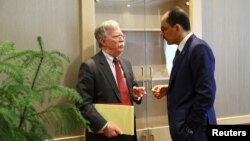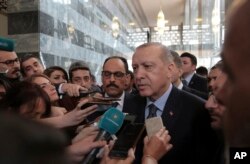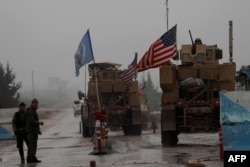U.S. National Security Advisor John Bolton ended a visit to Turkey in acrimony Tuesday with President Recep Tayyip Erdogan refusing to meet him. Erdogan dismissed Bolton's calls for the protection of the YPG Syrian Kurdish militia as a precondition to a U.S. troop withdrawal from Syria.
"Bolton has made a serious mistake and whoever thinks like this has also made a mistake. It is not possible for us to make compromises on this point," Erdogan said in an address in the Turkish parliament.
The YPG is a crucial ally in Washington's war against Islamic State, but Ankara considers it a terrorist group linked to an insurgency inside Turkey.
Erdogan also warned that preparations were complete for a military operation against the YPG.
"We will very soon mobilize to eliminate the terrorist organization in Syria," he said. "If there are other terrorists who would attempt to intervene in our intervention then it is our duty to eliminate them as well."
Turkish forces have been massing for weeks along the Syrian border. Observers said the threat of a Turkish operation against the YPG in northeastern Syria, where around 2,000 U.S. soldiers are deployed, was the reason for U.S. President Donald Trump's decision to withdraw from Syria.
Once Trump announced his intention, Erdogan said Turkey would delay any operation until all U.S. forces left.
Turkey's anger over preconditions announced by Bolton before a U.S. withdrawal, including security guarantees for the Kurdish militia, may have brought forward the timing of a strike against the YPG.
Erdogan sought to downplay his refusal to meet with Bolton, telling reporters it was not a deliberate snub. He maintained that Bolton's meeting with both the presidential spokesman and the defense minister was sufficient.
Turkish presidential spokesman Ibrahim Kalin, in speaking to reporters, tried to put a positive spin on his meeting with Bolton.
"A process of dialogue with U.S. military and officials would carry on," he said. "Syria should be cleansed from all terrorist organizations, no stepping back from the fight against Islamic State."
Dduring a two-hour meeting with Bolton, the U.S. Joint Chiefs of Staff Joseph Dunford and U.S. Syria envoy James Jeffrey, Kalin pressed for a commitment to recover all weapons handed to the YPG by American troops in its war against IS.
"They [Bolton, Kalin] had a productive discussion of the president's decision to withdraw at a proper pace from Northeast Syria," said a statement read by National Security Council spokesman Garrett Marquis. "The U.S. looks forward to the ongoing military-to-military consultations."
Containing the fallout
Despite apparent efforts by both sides to contain the diplomatic fallout, analysts suggest the U.S. position in the region has weakened since the withdrawal from Syria was announced.
"From a diplomatic point of view, it's a very difficult if not impossible position," said former senior Turkish diplomat Aydin Selcen. "To negotiate by starting to say 'yes, we are leaving and then putting some strings attached on your withdrawal' or try to impose some conditions to your counterparts, be they your adversaries or your allies."
Despite the heightened rhetoric and the threat of imminent military action, analysts suggest Ankara will try to avoid a full-blown crisis with Washington.
"Turkey cannot do anything against America," said international relations professor Huseyin Bagci. "We had a crisis in recent months and Turkey got her lesson from this conflict."
Economic cost
Last year, the Turkish currency collapsed after Trump imposed sanctions over the detention in Turkey of American pastor Andrew Brunson, who has since been released. Although the sanctions lasted only a few weeks, Turkey's economy is now facing a recession. The lira fell sharply Tuesday on fears of renewed U.S.-Turkish tensions.
Turkish media are also reporting divisions within Turkey's military over the launching of a military operation into Syria in winter and before the full withdrawal of U.S. forces.
Selcen predicts Erdogan will now look to Trump to resolve the current tensions.
"We have to wait to see what Mr. Erdogan has to say with Mr. Trump," he said, "because he [Erdogan] himself managed to persuade Mr. Trump that the United States will be leaving Syria."
Bolton under fire
Turkish media are already blaming Bolton for the latest tensions, accusing him of going "rogue." Washington is also facing criticism in Turkey for sending conflicting messages on its Syria policy.
Analysts, however, suggest Turkey is banking on shared regional interests and the personal chemistry of Trump and Erdogan to prevent a new crisis.
"There will be a lot of crisis and trouble, but both sides will try to solve this according to their national interest without violating the interests of the other," said Bagci. "And I see there is the political readiness and political will to do this between President Trump and President Erdogan."








